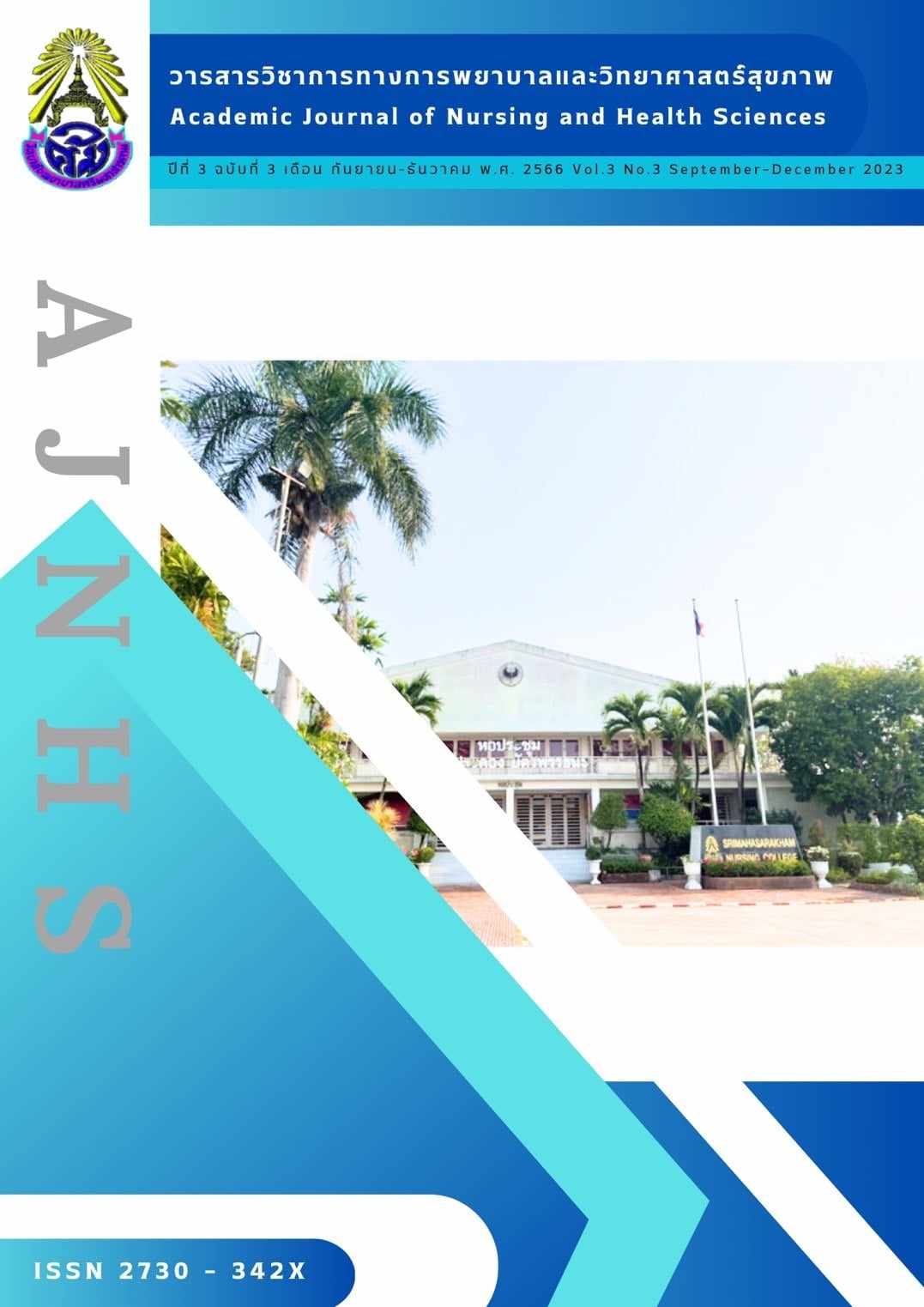Effects of Using Motivational Procedures in type 2 Diabetes Mellitus Patients with Poor Glycemic Control in the ChiangYuen subdistrict ChiangYuen District Maha Sarakham Province
Keywords:
Type 2 diabetes Mellitus, Hyperglycemia, Motivational InterviewingAbstract
This research is an action research. The sample group was a type 2 diabetic patient with a HbA1c level of 7-9 mg/dl in Chiang Yuen Subdistrict treated at the chronic disease clinic. The research was performed between October 2021 - July 2022, with a total of 261 cases using motivation-building skills (Motivational Interviewing). The research was divided into 4 phases: Phase 1: Study the problem situation of patients with type 2 diabetes in Chiang Yuen Subdistrict treated in the Chiang Yuen Nurse's Chronic Disease Clinic who have poor blood sugar control, Phase 2: Plan activities to solve the problem by having a brainstorming meeting and conducting a practical meeting to determine solutions to the problem, Phase 3: Carry out the process of creating health literacy at the individual level in patients with type 2 diabetes by changing behavior to control blood sugar levels to be within normal limits. Phase 4: results of operation evaluates.
Result: Using the process of enhancing motivational interviewing with 261 patients with type 2 diabetes, the results of the self-analysis and cluster analysis make diabetic patients aware of having behaviors to take care of their own health with a clear goal and time period. There is a possibility. The results of using My I – SMART Record found that patients had a better understanding of themselves and were inspired to take care of themselves. There was a common goal with the care team to take care of each patient's self-care. There was a clear timeline for practicing self-care in order to reach the goals as desired. In addition, it was found that the results assessing pre- and post-knowledge of diabetic patients were significantly different at a level less than 0.05, including the results of HbA1c levels after motivational interviewing, which were significantly reduced at a level less than 0.05.
References
กระทรวงสาธารณสุข .(2564). รายงานอัตราการป่วยตายด้วยโรคเบาหวาน. [ออนไลน์]. สืบค้นเมื่อ 10 ตุลาคม 2566. จาก https://hdcservice.moph.go.th/hdc/reports/report.php?source=pformated/format1.Php&cat_id=6a1fdf282fd28180eed7d1cfe0155e11&id=
f2516fbb85d4a4a5605c3ca1c4
เจษฎา จงไพบูลย์พัฒนะ. (2546). การประเมินประสิทธิผลของการใช้กระบวนการกลุ่ม ในการดูแลผู้ป่วยเบาหวานของโรงพยาบาลสตูล. วารสารวิชาการเขต 12, 14(3), 45-60.
เทอดศักดิ์ เดชคง. (2563). ผลของโปรแกรมการสนทนาแบบสร้างแรงจูงใจต่อการควบคุมระดับน้ำตาลในเลือดสำหรับผู้ป่วยเบาหวานชนิดที่ 2. วารสารสถาบันบำราศนราดูร, 14(3), 134-145.
บุญจันทร์ วงศ์สุนพรัตน์, ฉัตรประอร งามอุโฆษและ น้ำเพชร สายบัวทอง. (2564). ผลของการมีส่วนร่วมของชุมชนในการพัฒนากิจกรรมสร้างเสริมสุขภาพ ต่อความรู้และพฤติกรรมการดูแลตนเองของผู้ป่วยโรคเบาหวาน: กรณ๊ศึกษาตำบลตลาดขวัญ อำเภอดอยสะเก็ด จังหวัดเชียงใหม่. วารสารสมาคมพยาบาลแห่งประเทศไทยฯ สาขาภาคเหนือ, 27(1), 64-75.
พนิดา สารกอง. (2560). การศึกษาประสิทธิผลของโปรแกรมการสนทนาสร้างแรงจูงใจเพื่อสนับสนุนการควบคุมระดับน้้าตาลใน พลาสมาในผู้ป่วยเบาหวานชนิดที่ 2. ศรีสะเกษ: โรงพยาบาลนาคูณ.
ภัทรพล จึงสมเจตไพศาล. (2547). ประสิทธิผลของโปรแกรมการให้สุขศึกษาแบบกระบวนการกลุ่ม ในผู้ป่วยโรคเบาหวาน แผนกผู้ป่วยนอกโรงพยาบาลบ่อพลอย อำเภอบ่อพลอย จังหวัดกาญจนบุรี. วารสารแพทย์เขต 6-7, 23 (1), 77-89.
ละอองกลิ่น กนกแสง. (2564). ผลการสัมภาษณ์เพื่อเสริมสร้างแรงจูงใจต่อพฤติกรรมการดูแลตนเองและระดับน้ำตาลในเลือดสะสม ของผู้ป่วยเบาหวานที่ควบคุมระดับน้้าตาลไม่ได้. วารสารวิชาการสำนักงานสาธารณสุขจังหวัดมหาสารคาม, 5 (10), 161-170.
สมาคมโรคเบาหวานแห่งประเทศไทย (2560). แนวทางเวชปฏิบัติ สำหรับโรคเบาหวาน 2560. ปทุมธานี: ร่มเย็นมีเดีย.
International Diabetes Federation (2023) Facts & figures. [online]. Retrieved October 2023, 10. From https://idf.org/about-diabetes/diabetes-facts-figures/
Miller, W.R. & Rollnick, S. What makes it Motivational Interviewing?. Presentationat the International Conference on Motivational Interviewing (ICMI). Stockholm: 2010.
P.L.S. Steffen, C.S. Mendonça, E. Meyer, D.D. Faustino-Silva (2021) Motivational interviewing in the Management of Type 2 diabetes mellitus and arterial hypertension in primary health care: an RCT. Am J Prev Med, 60, pp. E203-E212, 10.1016/j.amepre.2020.12.015
Prochaska, J. O., & DiClemente, C. C. (1984). The transtheoretical approach: Crossing traditional boundaries of therapy. Dow Joneslrwin.
WHO (April 2023, 5). Diabetes. [online]. Retrieved October 2023, 10. From https://www.who. int/news-room/fact-sheets/detail/diabetes
Downloads
Published
How to Cite
Issue
Section
License

This work is licensed under a Creative Commons Attribution-NonCommercial-NoDerivatives 4.0 International License.


